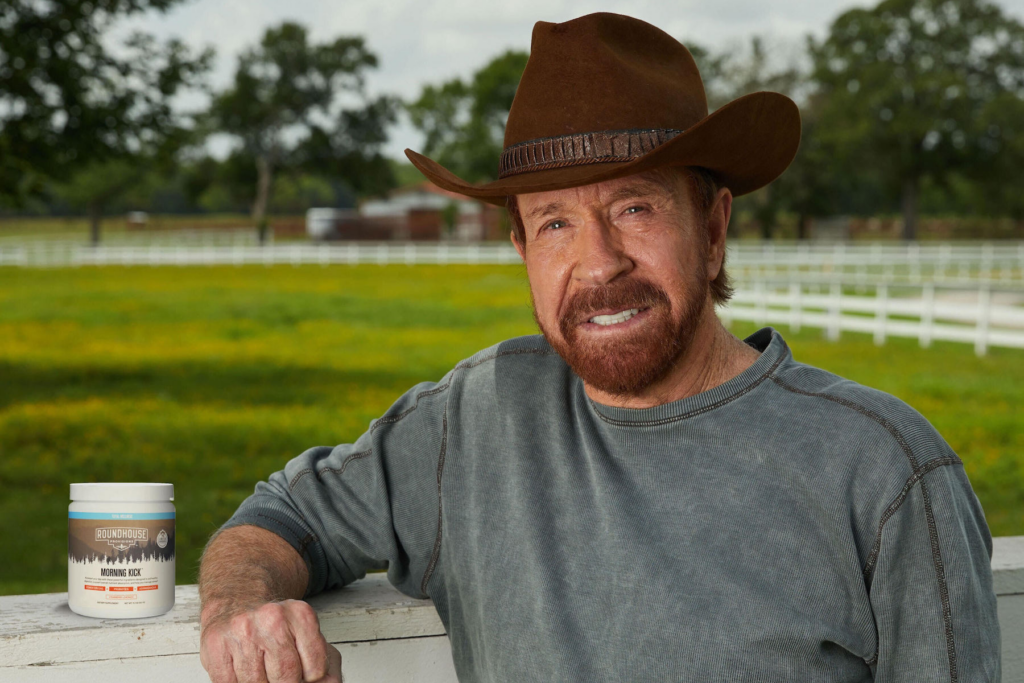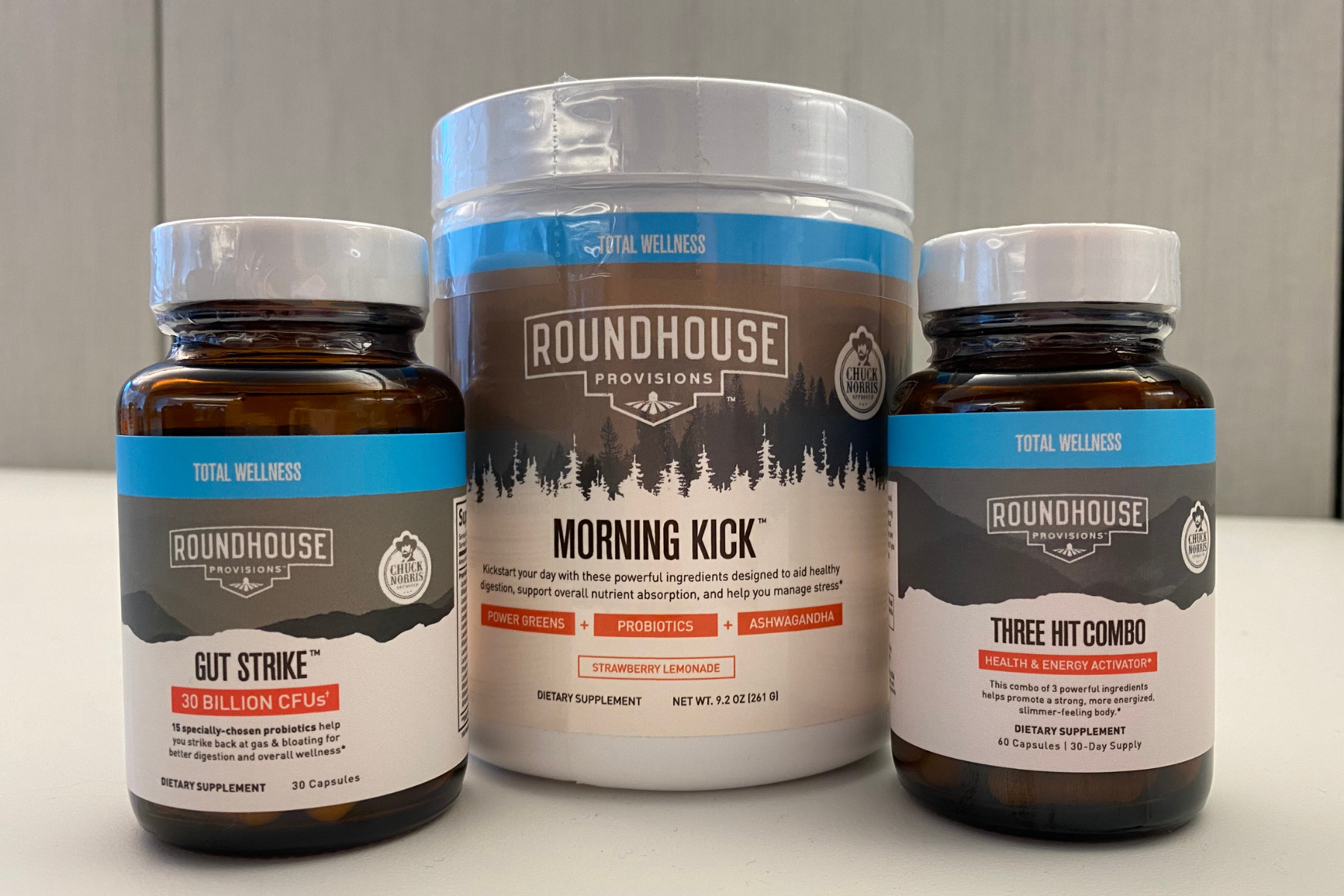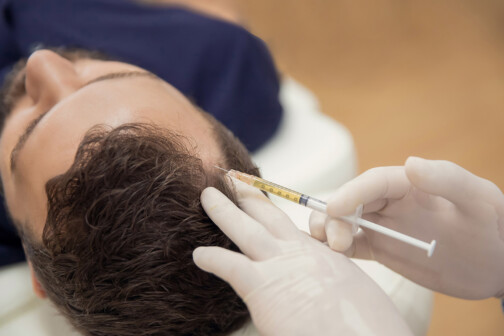If you’re wondering what Chuck Norris is doing in his retirement days, it’s not karate-chopping mulleted outlaws. Instead, the Oklahoman whose legendary 90s TV show often filmed in North Texas has entered into the dietary supplement biz with Morning Kick, his daily drink mix.
Odd, I know, for the daytime TV Texas lawman to now be sharing his name to supplement powders, but it’s surprisingly all thanks to 2021’s Winter Storm Uri. According to Roundhouse Provisions, the company behind Morning Kick, Norris wanted to help people “stay strong and ready to handle any situation” after witnessing Texans struggle during the ice storm. Which, frankly, sounds like a reach. But he launched Roundhouse Provisions in 2022 with emergency food kits—and Morning Kick.
While a freak blizzard might have inspired Cordell Walker, plenty of others have been obsessed with dietary supplements for years. About half of the adult American population takes some kind of supplement, such as fish oil pills or powders with huge marketing budgets like Athletic Greens, according to Harvard Health.
Intrigued, I decided to try Morning Kick. Maybe it would help me roundhouse bad guys in the noggin just like Chuck.
The Supplement
My package (note: I received these supplements as a complimentary sample) came with three jars: The Morning Kick powder, which contains power greens, probiotics, and ashwagandha. This herb supposedly helps digestion, supports nutrient absorption, and manage stress. There was a bottle of “Gut Strike” probiotic capsules to help me “strike back at bloating.” And there were the “Three Hit Combo” capsules, a health and energy “activator” that helps “promote a strong, more energized, slimmer-feeling body.” In total, these three jars contained a 30-day supply and retail for about $220.
How My Trial Went
Morning Kick looks like powdered dead grass, but tastes like strawberry lemonade Crystal Light. On Day 1, I scooped a tiny amount into eight ounces of water, hoping it would cure my sleepiness and Monday morning blues.
I didn’t want to change anything about my routine, so after I finished Morning Kick, I drank my habitual cup of tea. My energy felt high. I didn’t get the typical mid-afternoon slump that makes the 3 p.m. hour so miserable. I didn’t have much of an appetite, so I forgot to eat lunch. When I got home at 5 p.m., I crashed.
As the days went on, I added Gut Strike and something called the Three Hit Combo into the fold. I felt more full and energized in the morning—but I had to still drink my tea. On Wednesday, I only drank the powder in the morning, and, by mid-afternoon, I crashed faster than Jimmy Trivette after a long day running after Walker. I definitely wasn’t as hungry during the day, but I was exhausted by the end of it.
Overall, I didn’t notice any major changes to my body during my weeklong trial. I did feel less bloated and more energized. (I don’t think I had enough power to knock out any ‘80s villains, but I could certainly give ’em a hearty “hi-yah!”) However, I wasn’t sure if anything I had noticed was actually thanks to the supplements or just placebo effect trickery.
So, I reached out to UT Southwestern’s Dr. Jaclyn Albin, an internist and pediatrician who specializes in culinary and lifestyle medicine to answer my burning questions about supplements and Morning Kick.
What exactly are dietary supplements?
Supplements cover several categories, Albin says. There’s your traditional vitamins and minerals, like a daily multivitamin. There are herbs and botanicals, pre and probiotics, and amino acids. They can come in a wide variety of formats and packages, like pills, capsules, gummies, the ever-popular powders, and even herbal teas.
So, what are the health benefits?
There’s no cure-all to good health, Albin says, and there’s no research that proves the general population needs to take a supplement. That said, very few Americans are actually meeting their nutrient needs. While the best way to get all our nutrients is a balanced diet, supplements can be beneficial. For example, a vitamin D deficiency is “an easy thing to treat with a supplement,” Albin says. But some supplements, like vitamin D, have a “therapeutic window,” where they become toxic in excess. And different formulations treat different problems. Sure, magnesium can help with muscle cramps, but it’s also prescribed to treat constipation—and that’s a formulation you don’t want to mix up.
Morning Kick touts ashwagandha as an active ingredient. What is that?
Ever since I took Morning Kick, I’ve seen ashwagandha everywhere—in my local grocery store, my tea, my dreams. The evergreen herb has been used in Indian Ayurvedic medicine for thousands of years. “It is popular right now, because it’s known as an adaptogenic herb,” says Albin, meaning it can purportedly improve stress levels, as well as boost energy and reduce inflammation. It’s relatively harmless, Albin says, so if you want to take it, just check the dose and with your doctor. But, she says, there hasn’t been much modern research done on the herb, and most of what’s been done is animal based, like rats.
What are superfoods and power greens?
A superfood is something that’s considered a “nutritional powerhouse,” Albin says, meaning “you get a lot of nutrients for either a small amount or for not very many calories.” While people should be eating these types of food, like kale, the terms are more of a marketing ploy, she says. In general, half your plate should be fruits and veggies, and you should be eating the “rainbow of plants.”
Superfoods are good, but the supplement will need to use its active ingredient properly in order for you to reap the nutritional reward, she says. For example, turmeric is used as a supplement and a spice. It’s anti-inflammatory and contains antioxidants. The active ingredient in it is curcumin, which is activated by black pepper. If there’s no black pepper in your supplement, then so sad, but all that turmeric does is add taste.
What are pre and probiotics?
Simply put, probiotics are little bugs, or microorganisms, that live in and support our bodies, Albin says. Prebiotics are the food they eat. Having a healthy microbiome—the total collection of microorganisms—can help digestion, inflammation, and more. Instead of a supplement, you can ingest these bugs (yum) through your diet. For probiotics try fermented foods, like yogurt, sauerkraut, unpasteurized pickles, and kombucha. For prebiotics, try fiber sources, like oats, onion, garlic, berries, and bananas. Just be wary of added sugars, Albin says. “Excess sugar, and saturated fat and ultra-processed foods create unhealthy colonies of microorganisms.”
If I do take a supplement, how long does it take to work?
It depends on the supplement, Albin says. If you take magnesium for constipation, “you should have results within two days.” It also depends on if you know specifically what deficiency you’re trying to fix. Generalized fatigue could be caused by a number of factors, like stress, poor sleep, or lack of exercise, she says. If you choose a supplement, check if there’s research that shows the active ingredient treats whatever symptom you want to treat, then monitor that symptom. In general, it should take two-to-four weeks to notice anything. I only took Morning Kick for one week, which, according to this, wasn’t enough time.
What else should I be aware of?
Supplements are not considered medicines by the Food and Drug Administration. “They cannot claim to prevent, treat, or cure any illness or diagnose any illness.” The dietary supplements industry is largely unregulated. And your vitamins may not actually accomplish what their marketing declares. In that case, “you now have expensive urine.” Albin recommends reading the inactive ingredients list and checking if the company does any independent safety research. Most importantly, get your advice about supplements from a medical professional.
So, should I even be taking a supplement?
While she doesn’t take any herself regularly, and drinks herbal tea really only for the taste, Albin is not anti-supplement. “My general approach is that if it’s not harmful to my patients, I’m fine with them trying things,” she says. She just wants people to read through the ingredients, do the appropriate research, and talk to a medical professional before they do more harm than good to their bodies. And she wants people to remember there’s no replacing a balanced diet and healthy lifestyle. Says Albin, there is no short cut to good health. Or being a Texas Ranger.
Author







